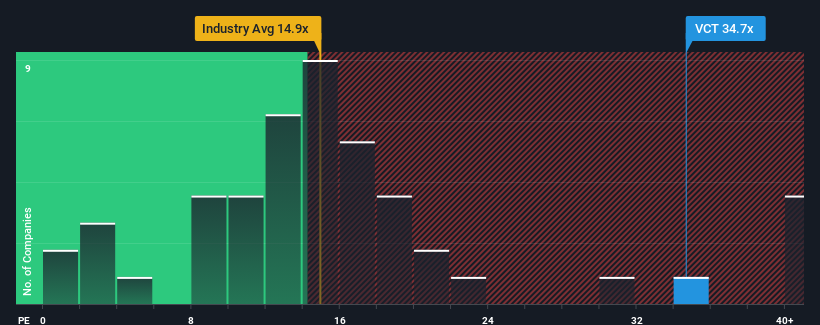- New Zealand
- /
- Other Utilities
- /
- NZSE:VCT
Market Participants Recognise Vector Limited's (NZSE:VCT) Earnings
Vector Limited's (NZSE:VCT) price-to-earnings (or "P/E") ratio of 34.7x might make it look like a strong sell right now compared to the market in New Zealand, where around half of the companies have P/E ratios below 14x and even P/E's below 10x are quite common. Nonetheless, we'd need to dig a little deeper to determine if there is a rational basis for the highly elevated P/E.
With its earnings growth in positive territory compared to the declining earnings of most other companies, Vector has been doing quite well of late. It seems that many are expecting the company to continue defying the broader market adversity, which has increased investors’ willingness to pay up for the stock. You'd really hope so, otherwise you're paying a pretty hefty price for no particular reason.
View our latest analysis for Vector

Is There Enough Growth For Vector?
There's an inherent assumption that a company should far outperform the market for P/E ratios like Vector's to be considered reasonable.
If we review the last year of earnings growth, the company posted a worthy increase of 11%. EPS has also lifted 16% in aggregate from three years ago, partly thanks to the last 12 months of growth. So we can start by confirming that the company has actually done a good job of growing earnings over that time.
Shifting to the future, estimates from the three analysts covering the company suggest earnings should grow by 31% per year over the next three years. With the market only predicted to deliver 18% per year, the company is positioned for a stronger earnings result.
In light of this, it's understandable that Vector's P/E sits above the majority of other companies. It seems most investors are expecting this strong future growth and are willing to pay more for the stock.
The Final Word
While the price-to-earnings ratio shouldn't be the defining factor in whether you buy a stock or not, it's quite a capable barometer of earnings expectations.
We've established that Vector maintains its high P/E on the strength of its forecast growth being higher than the wider market, as expected. At this stage investors feel the potential for a deterioration in earnings isn't great enough to justify a lower P/E ratio. Unless these conditions change, they will continue to provide strong support to the share price.
There are also other vital risk factors to consider before investing and we've discovered 2 warning signs for Vector that you should be aware of.
If these risks are making you reconsider your opinion on Vector, explore our interactive list of high quality stocks to get an idea of what else is out there.
New: Manage All Your Stock Portfolios in One Place
We've created the ultimate portfolio companion for stock investors, and it's free.
• Connect an unlimited number of Portfolios and see your total in one currency
• Be alerted to new Warning Signs or Risks via email or mobile
• Track the Fair Value of your stocks
Have feedback on this article? Concerned about the content? Get in touch with us directly. Alternatively, email editorial-team (at) simplywallst.com.
This article by Simply Wall St is general in nature. We provide commentary based on historical data and analyst forecasts only using an unbiased methodology and our articles are not intended to be financial advice. It does not constitute a recommendation to buy or sell any stock, and does not take account of your objectives, or your financial situation. We aim to bring you long-term focused analysis driven by fundamental data. Note that our analysis may not factor in the latest price-sensitive company announcements or qualitative material. Simply Wall St has no position in any stocks mentioned.
About NZSE:VCT
Vector
Engages in electricity and gas distribution, telecommunication and new energy solutions businesses in New Zealand.
Proven track record with mediocre balance sheet.
Similar Companies
Market Insights
Community Narratives



